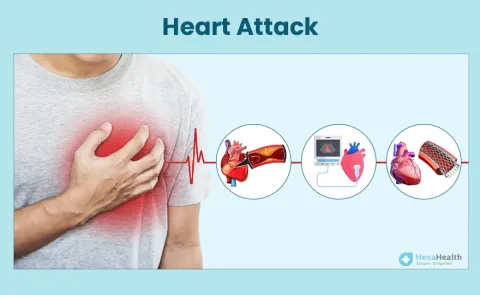Once you reach the hospital, your doctor will carry out several tests to confirm if you have had a heart attack.
Non-Invasive Tests:
Blood tests: After a heart attack, certain cardiac proteins progressively leak into your bloodstream. These proteins, or enzymes, will be tested in your blood by emergency room doctors.
Electrocardiogram (ECG): This is one of the first tests done to diagnose a heart attack. The electrical activity of your heart is measured by attaching electrical leads attached to your arms, chest, and legs.
Other non-invasive tests that are carried out include:
- Chest X-ray
- Cardiac CT scan or MRI
- Echocardiogram
Invasive Diagnostic Tests:
Coronary Angiography: Angiography helps to detect a blocked or narrowed coronary artery. During this process, a small tube or catheter will be inserted into your coronary artery through a blood vessel in the groin. The coronary artery is then pumped with a contrast agent, which helps to visualize the narrowing or blockages of the arteries
Treatment of Heart Attack
Emergency Treatment At Home
Heart attack treatment requires immediate action. Take the following steps if you or your loved ones are having a heart attack to help save one's life:
- Chew and swallow an aspirin tablet (preferably 300mg) unless you are allergic to it. This will help to thin your blood and improve blood supply to the heart.
- If you have already been using nitroglycerine for any known heart condition, then take it now. This expands the coronary arteries to enhance oxygen delivery to the heart muscle.
Call an ambulance or your friends and family to drive you home.Emergency Treatment At The Hospital
Depending on the severity of the heart attack, it can be treated with medications to dissolve blood clots or require surgical intervention.
Medications: Thrombolytic Medications are used to dissolve blood clots restricting blood flow during a heart attack. These drugs must be given as quickly as possible to lower the amount of damage to the heart muscle. Other drugs may be administered to lower the chance of a second heart attack. These include the following: aspirin, anti-platelets, and anti-coagulants.
Cardiac rehabilitation
Enrol in a cardiac rehabilitation program after your heart attack. Cardiac rehab is a medically supervised program that is designed to help you improve your cardiovascular health. This program involves a combination of exercises, counselling, and educational sessions.
Lifestyle Changes
Suffering from a heart attack requires making lifestyle changes in future. These include:
- After a heart attack, physical activity (as directed by a cardiologist) will be important for maintaining long-term heart health.
- If you still haven't stopped smoking, this is the time to do it.
- Eat a diet that is good for your heart. Low-cholesterol and low-saturated-fat foods should be included in your diet. Increase your intake of fruits and vegetables. Reducing your intake of red meat instead may increase your intake of white meat and fish.
- Have control of your cholesterol and blood pressure levels.
- Reduce your stress levels.
What to Ask and Tell Your Doctors?
When the patient is brought into an emergency, the doctor may enquire about any previous cardiovascular problems of the patient.
Surgery
Two types of interventional procedures can be carried out to help restore the heart's blood flow during a heart attack
Coronary Angioplasty:
- During this surgical procedure, your cardiologist will use a special balloon to open the blocked coronary artery.
- A specific metal tube (stent) may then be left inside your artery to keep it open.
- Angioplasty is not possible if there are too many blocks in the coronary arteries. In such cases, an alternative surgery, known as coronary artery bypass graft surgery, is carried out.
- After being discharged home, most patients recover and return to work within a week.
Coronary artery bypass graft surgery (CABG):
- During CABG, blood vessels from either your arms, legs, or chest are attached above and below the blocked coronary artery. This new blood vessel is termed a graft.
- It enables the increase of oxygen supply and blood flow to the heart by creating diversions around congested or blocked areas of the major arteries.
- You'll probably feel a little groggy and uncomfortable following the treatment, but you'll be given medicines to help you feel better.
- After CABG, you'll generally need to stay in the hospital for about a week.
- It takes time to recover following a CABG procedure, and everyone recovers at a different pace. The majority of people recover completely within 12 weeks of surgery.





























